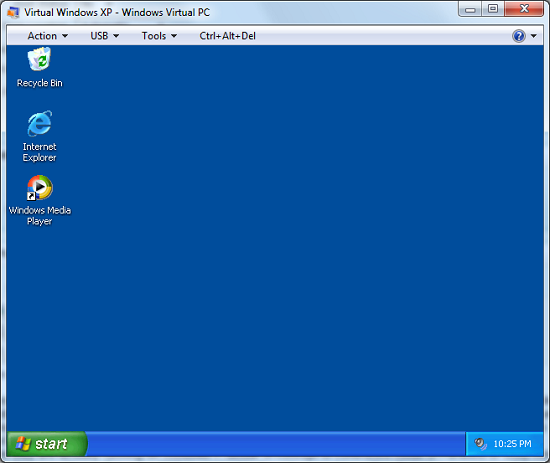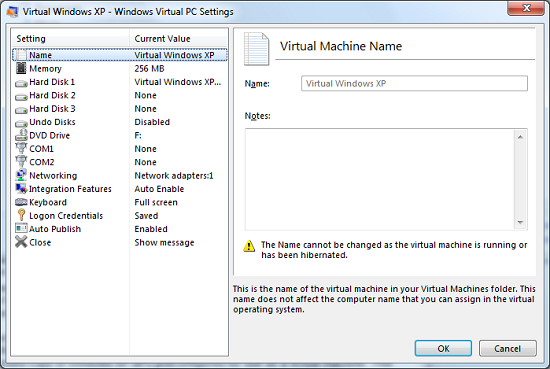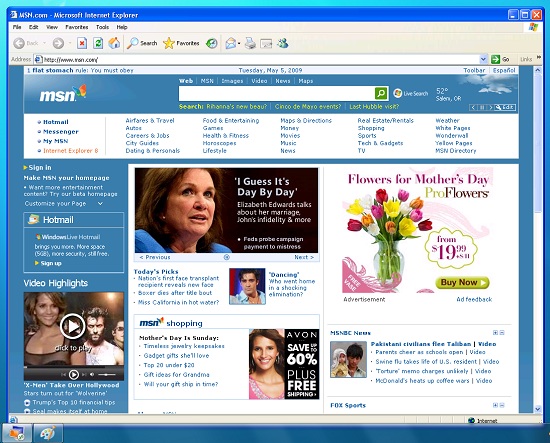Windows 7: Release Candidate 1 Preview
by Ryan Smith and Gary Key on May 5, 2009 11:00 PM EST- Posted in
- Systems
Virtual Windows XP
As we mentioned previously, Microsoft’s big secret unveiled with Windows 7 RC1 is Virtual Windows XP (VXP for short). One of the issues Microsoft has been having in bringing business users over from Win2K and XP to Vista and beyond has been that Windows does not have perfect backwards compatibility. With consumer applications this is not such a big deal since most of those are wide-audience products that get updated regularly, but this is not always the case for business software. Whether it’s some custom in-house application that no one can fix, or a 3rd party application that just works and can’t be updated, business users sometimes can’t escape the fact that they need to be able to run old applications that don’t work in newer operating systems.
VXP is in essence the bone Microsoft is throwing to business users to allow them to run those old applications while using Windows 7. VXP leverages Microsoft’s existing Virtual PC virtualization software that they acquired several years back, by bundling it with a fully licensed copy of Windows XP SP3 preconfigured for use as a virtual machine. This virtual machine can then be partially integrated in Windows 7 so that applications operating inside of it look and behave like they are actually running on Windows XP, similar in concept to the coherence mode of Parallels or Unity mode of VMware. In this case Microsoft is using RDP to connect to the virtual machine rather than screen scraping the entire desktop like Parallels and VMware do. Microsoft does the same thing for the Windows Home Server Console.

VXP Desktop View
As Virtual PC was already free, the significance of this announcement is not the technical details, but rather that Microsoft is endorsing it as an official solution to backwards compatibility problems. It’s long been expected that Microsoft would do something with Virtual PC as a backwards compatibility solution and this is finally it, albeit in a limited role.
Because of the system requirements and issues raised by relying on a virtual machine of XP, VXP is a last-ditch compatibility solution rather than any kind of primary solution. On the system requirement side, VXP requires a processor with hardware virtualization features, along with at least 256MB of RAM and the disk space needed to run the virtual machine. It’s not too bad for a modern system, but it does rule out an older system that may be suitable for upgrading to Windows 7, but not running VXP on top of that.

VXP Configuration
As for the issues raised by using VXP, first and foremost it’s a complete copy of WinXP, with all of its security deficiencies and bugs. It needs security software, it needs administration, and it needs security updates. This also brings up a matter that Microsoft hasn’t answered yet: what happens when WinXP support ends in 2014? Windows 7 will have support until at least 2020, which means either Microsoft is going to drop support for this component of Windows 7 early (an unprecedented move) or they have to extend XP support to match Windows 7’s support cycle. We’re still trying to get a final answer on this.
It should also be noted that VXP only comes with Professional edition and higher, as it’s not intended to be a consumer compatibility solution. And before anyone gets any ideas, it’s not suitable for playing games – the graphics hardware is the usual emulated S3 Trio 64, and the screen does not refresh nearly fast enough to keep up with any kind of action game. Solitaire may be playable, however.

VXP in integrated mode running IE6
At any rate, Virtual Windows XP is a good solution to some compatibility needs, so long as it’s recognized that it’s not the solution to all compatibility needs. For the handful of business users it’s designed for, we would expect that it does its intended job well. However for non-business users that absolutely must have a virtual machine (and won’t need support from Microsoft), it may be worthwhile to look into a free solution like VirtualBox.
Looking towards the future, there has been a lot of speculation that Microsoft may try to make a big break from the Windows APIs in order to clear out all the cruft and deprecated functions that litter their APIs. This isn’t happening today with Windows 7 and VXP, but integrating a virtual machine is the first stepping stone in making it happen. What Microsoft does after VXP is undoubtedly going to be a matter of great interest.










121 Comments
View All Comments
ssj4Gogeta - Wednesday, May 6, 2009 - link
Exactly what SkullOne said. I also use Linux and know in what areas it's better than Windows. But I also know there are so many other areas in which it's a pain to use.SkullOne - Wednesday, May 6, 2009 - link
Spoken like a true jaded Linux fanboi. People like you are the reason Linux will never be mainstream. You think you're so high and mighty (or more secure) when you're not.Thanks for the laugh. I'd love for you to back up ANY of your comments with facts.
Disclaimer: I use Linux and Windows every day in production environments. They both have their place in the world.
snookie - Wednesday, May 6, 2009 - link
This blaming of Microsoft's Vista woes on Apple and a few commercials is just ridiculous. Most people pay no attention to such things those few that see them. It also has nothing to do with why Vista was a flop in the consumer space and an even bigger flop in the corporate marketplace. Certainly nothing to do with so many companies offering XP downgrades. Vista is a lousy product plain and simple and if there is any marketing fault it is Windows with their arcane multiple editions at ever increasing prices designed to milk customers. People aren't stupid even if they are computer novices. They know when they have been had, something is difficult to use, or not reliable. This is the result of years of piling layer upon layer of code on an ever expanding code base with no effort to start over and offer a clean efficient OS. The ONLY thing Windows 7 has over Vista is the interface is simplified and gets out of your way better. It can SEEM to run faster all it wants but test after test shows Windows 7 is barely faster than Vista at many tasks and in fact slower at some. Microsoft is in real trouble here because years of cruft code have left a huge amount of unusable code that consumes resources, adds instability, and provides entry to all sorts of malware. There is no way this codebase can be made to work efficiently with the quad and higher core procs that will be even more common in the next few years and what is Microsoft going to do then? They have three failed ad campaigns under their belt so their years of lying to their customers has fallen flat and corporate customers long ago stopped believing anything Microsoft said which is why open source that doesn't lock you in is becoming more and more prevalent. Microsoft has met the enemy and it is them.I notice you run Microsoft ads btw.
ssj4Gogeta - Wednesday, May 6, 2009 - link
I know so many people who haven't even TRIED Vista once and they keep telling other people how bad it is.formulav8 - Wednesday, May 6, 2009 - link
I agree almost 100%. I have customers who wants to make sure they have/get windows xp because vista is so bad. If you ask them why, they basically say its because a friend of a friends father said it was slow.I do know one of the biggest downfalls for Microsoft and Vista was allowing Intel to pressure them into getting Vista Certified compatability with those trashy integrated chipsets of Intel. So many users have those trash Intel xtreme/gma video chipsets and they had very bad Aero interface performance.
Anyways, I use both Vista and Windows7 daily. I like Vista better than XP overall and like Windows7 thus far compared to Vista.
I really think Windows7 will end up being one of the best oses made, even when compared to osx and windows xp.
Jason
vectorm12 - Wednesday, May 6, 2009 - link
Personally I never took to windows XP nor vista(had it been tecnologically possible I would still have been on WinNT 4.0), however as I bought a new PC I hit the RAM cap of 32bit XP Pro and therefore felt I had no decent choice than to move to 64bit Vista.My Vista experience has been far from great, reinstalls, crap drivers from nVidia and ATI not to mention a bunch of other third parties. However it hasn't been all bad, vista has quite a few ideas that just didn't work out just the way I would have liked.
Look at the save file dialogs for example where you actually had to click a button to browse directories other than the default one.
I've now been running on Win7 x64 since build 7k reinstalling almost every time a new version has been leaked and I'd say most of the things that bugged me with Vista has been corrected.
At this point the only thing I still want for Win7 is the "old" style control panel and an integration of the "administrator tools" into the control panel.
Looking at the big picture I say Win7 (even in BETA) is the best modern OS Microsoft has produced. The performance issues of Vista have been dealt with to a large degree. Drivers seem to work better and the most annoying GUI issues have been dealt with.
All Microsoft can do now to make me feel completely satisfied with my computing experience over the last few years is give me a BIG rebate on the upgrade to Windows7 from my old Vista licence.
johnsonx - Wednesday, May 6, 2009 - link
I just upgraded my XP-era Vista box (2.2ghz single core A64, 2GB RAM, VIA AGP mobo, X1950Pro) to Windows 7 tonight, and it was absolutely painless. It certainly seems faster than Vista, in particular I notice that my e-mail client and web browser launch and become ready much more quickly.I'm finding the new UI features to be actually useful as well, rather than Vista's pointless eye candy. I often have 6 or 7 browser tabs and several e-mail windows open, along with another couple of apps, and the new task bar makes it much easier to switch among them. I can see if I have any new e-mail just by moving the mouse over the client icon on the taskbar, no need to even click on it. Aero-Peek makes gadgets more usable too, since you can see them without minimizing every window. AeroSnap is great too. Only AeroShake defies explanation, but perhaps time will prove that one too.
I was never a Vista hater, though it certainly had it's frustrations. But it only took me 20 minutes with Windows 7 to never want to touch another Vista box again.
I was initially concerned that ATI's Windows 7 driver only supports cards back to the HD2000 series (presumably because the WDDM 1.1 driver model requires DX10 class hardware, which my X1950Pro is not), but the MS provided driver had no problems with Half-Life 2 (the only game I happen to have installed on this box) or any of the fancy GUI features.
The only weirdness so far as that at last boot up Windows told me a driver for Trend Micro Internet Security was being blocked due to a compatibility problem with Windows 7. That's understandable, except for the fact that I don't have any Trend Micro product installed, nor has one ever been installed in the past. It wouldn't tell me exactly what driver it was complaining about though, so I can't investigate further (I suspect some log somewhere will tell me exactly what driver it blocked).
One taskbar UI incontinuity: so much now works by simply moving the mouse over the various items, it suddenly seems odd to have to actually click on the start menu to get it to open.
johnsonx - Wednesday, May 6, 2009 - link
ok, it turns out the offending driver was TMCOMM.SYS, and it really was from Trend Micro. I have a vague recollection of running an online scan once a couple years ago (trying to scan a friend's external drive), so I guess it was trend micro and it left that driver around.As with most such things, the blocking event was neatly logged in the system event log.
thebeastie - Wednesday, May 6, 2009 - link
Wow, this new OS looks like Vista but with all the latest patches,IE8 and DirectX11. Then just a few cosmetic graphics changes.I AM EXCITED!
Come on what else did you expect? Maybe its something that has stuck deep in side people since they were kids around new PCs but when it comes to Microsoft new OSes people are just getting more and more nieve.
thebeastie - Wednesday, May 6, 2009 - link
More tests appear to be slower in Windows 7 then Vista etc.Things like reltek sound performance can be put to just as much to the 3rd party drivers then anything else.
I can't believe how many people I have talked to that use but hate Vista and expect Windows server to be light on its feet as XP but with the features of Vista, they are behaving as its something they could bet their life on.
What does it take for people to get some some technical intuition?
I mean thats what people really really really need here.